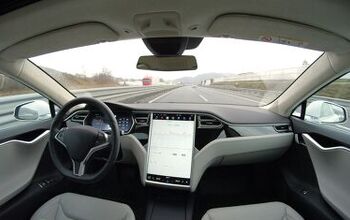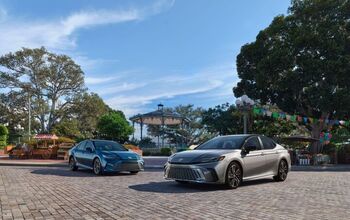Hyundai Struggles Against Infrastructure Issues To Meet Global FCV Sales Target
Global sales of Hyundai’s Tucson Fuel Cell haven’t been able to match sales targets since the FCV’s launch in 2013, though not for a lack of trying.
Hyundai says it shipped a total of 273 units of the Tucson Fuel Cell to showrooms in its home market and abroad since 2013, Yonhap News Agency reports, 69 of which were delivered in 2015 thus far. The automaker planned to move 1,000 units by the end of 2015, a goal not likely to occur at this rate.
As for why, the problem comes down to infrastructure. Hyundai Auto Canada representative Chad Heard told TTAC the Canadian subsidiary leased two Tucson Fuel Cells thus far, and received its second shipment for allocation this month.
Heard explained there were more interested consumers than actual product, but doesn’t expect for sales to hit double-digits in 2015 due to infrastructure constraints, adding the company would be able to meet demand in Canada “if there was more access to hydrogen gas.” There is only one filling station available to Tucson Fuel Cell owners, located in Surrey, British Columbia, while the United States and South Korea fare little better with 10 and 11 stations, respectively.
[Photo credit: Hyundai]
Seattle-based writer, blogger, and photographer for many a publication. Born in Louisville. Raised in Kansas. Where I lay my head is home.
More by Cameron Aubernon


































Comments
Join the conversation
I remember Toyota putting out a video showing that hydrogen could be made from manure. At the very first step they show a farmer in a diesel particulate spewing tractor scooping up the manure, a truck hauling it away, then all of the processes involved which are obviously using energy at each step - not to mention the energy required to compress it to 10,000 PSI and transporting it to the fuel station. It's seems like a hell of an inefficient process to create electricity. https://goo.gl/xjmBs9
The whole hydrogen escapade has a theme song: "What Is and What Should Never Be".
The infrastructure problem is what every armchair critic has been saying is wrong with hydrogen, from Day One. That, and the cradle-to-grave energy math doesn't come close to working. On infrastructure: H2 stations are much more expensive than EV chargers, but Tesla has helped secure its own success by funding the Supercharger network itself. I remember Toyota was looking for state subsidies to pay for H2 stations - not gonna happen. So are Hyundai and Toyota going to persist with this madness, or will they find a way to exit gracefully? I suppose the answer depends on whether their home countries continue to subsidize their work.
If there were a way to use solar energy to isolate the abundant hydrogen already present in the atmosphere (as well as water), we could have a virtually limitless energy source without any pollution at all.